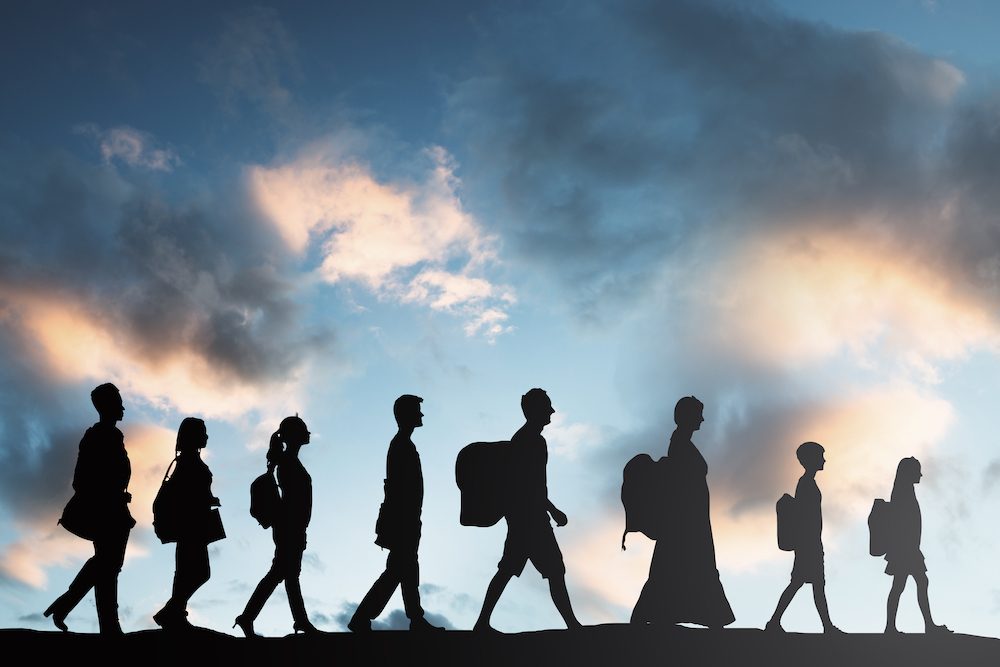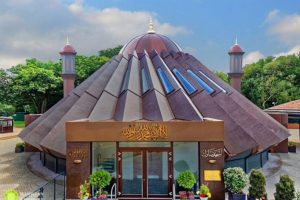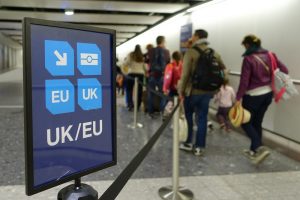
Tariq Mahmood, Toronto, Canada
In 2016, one of the major issues of the US presidential race was immi- gration. Presidential candidate Donald Trump promised a border wall between the United States and Mexico to stop immigrants from coming in. Several years later, during the administration of President Joseph Biden, on an official visit to Guatemala, Vice-President Kamala Harris told would-be illegal immigrants, ‘Do not come. Do not come. The United States will continue to enforce our laws and secure our borders.’ [1]
But immigration is not just a hot topic in the United States. British Prime Minister Keir Starmer announced this year that he had approached Italy to consult its far-right Premier, Giorgia Meloni, about how it plans to send illegal immigrants to Albania to process their asylum claims. This comes after a failed initiative by the previous conservative government to send asylum seekers arriving in the United Kingdom to Rwanda. [2] And in September, Germany announced more border checks, to the consternation of its EU neighbours. [3]
These recent policy shifts highlight that, post-COVID, immigration has been on the rise. In 2023, the US, Canada, the UK and Australia saw double to triple the immigrants than they admitted in 2019. [4]
A large part of the discussion around immigration is about the economy. As His Holiness Hazrat Mirza Masroor Ahmad (aba), Worldwide Head of the Ahmadiyya Muslim Community points out:
‘In fact, a major root cause of the dis- cord has been the global financial crisis. When there was no recession or credit crunch, nobody ever bothered about the influx of immigrants; Muslims or
non-Muslims or Africans. However, the situation is now different and that has caused all this. It has even affected the mutual relationships of European countries, and so anger and resentment between the people of certain European nations and the people of other Euro- pean countries is increasing daily. This state of despair is visible everywhere.’ [5]
But governments must deal with immigration wisely: ‘If governments do pro- vide some benefits or financial aid to im- migrants, they should ensure that they do not neglect the needs of the local people. In some countries, immigrants received better benefits than tax-paying citizens and this led to a natural agita- tion amongst the public.’ [6] At the same time, governments should help migrants with ‘some form of training or apprenticeships so that they can soon develop those skills. Any costs incurred in such training will be a valuable investment for the future of the nation.’ [7] And for their part, immigrants should come willing to work: ‘Even if refugees are forced to do menial or basic jobs, which they consider themselves over-qualified for, it is better than remaining idle and expecting the state to cover all their needs. Otherwise, immigrants who fail to contribute to society will be a means of increasing restlessness amongst the wider population.’ [8]
Integration, But At What Cost?
Another reason that immigration is a concern is because native-born citizens fear that immigrants will change the culture, or that they will not properly integrate. For example, some countries across Europe, France foremost among them, have taken measures to prevent Muslim women from covering their heads or faces in public schools or pub- lic buildings.
But the key question is what integration really means: While some may argue that integration requires dressing in the same way, eating the same food or speaking the same language, Islam teaches that true integration is not about these superficial aspects. Rather, ‘Islam teaches that a person should not just strive to acquire or desire peace for himself, but should make full efforts to spread peace and harmony to other people with the same longing they hold for themselves. This selfless attitude is the way to establish peace in the world. Is there any society that would not ap- preciate such teachings and would not approve of such an approach?’ [9] Thus, immigrants themselves have a responsibility to work for the betterment of their adopted countries.
Islam also teaches that citizens must be loyal to their adopted countries: ‘Islam does not permit any form of disloy- alty to the country whatsoever. This is an absolute and unequivocal teach- ing. Islam does not permit any form of rebellious behaviour, or for a citizen to scheme against his nation – whether adopted nation or otherwise – or to harm it any way.’ [10]
Freedom of Religion
Preserving freedom of religion, or free- dom of conscience, should be a para- mount value for societies that value in- dividual rights. In that respect, Muslim immigrants or citizens should also be afforded this right. ‘Certainly, if Muslims are asked to do something that is not right or are told to disregard the instructions of the Holy Qur’an relating to the principles of modesty, the sanctity of the religion or to act against righteousness, then they cannot do so. However, such matters are not a ques- tion of integration, but are actually about personal religious freedom.
The violation of religious freedom is not only a question for Muslims alone to stand up against, but in fact, all sincere and decent people stand up and speak against this and openly declare that no government or society should interfere with personal religious rights.’ [11] Regardless of religion or belief, it is vital that the rights of all citizens to practise their faith as they wish are preserved.
However, there is a deeper issue. Many believe that Islam is a religion that does not believe in preserving the religious rights of others. Looking to the governments of Iran and Afghanistan, people suppose that Islam requires that religion be enforced at the state level. Yet in the Holy Qur’an, God states, ‘Those who have been driven out from their homes unjustly only because they said, “Our Lord is Allah” – And if Allah did not repel some men by means of others, there would surely have been pulled down cloisters and churches and synagogues and mosques, wherein the name of Allah is oft commemorated. And Allah will surely help one who helps Him. Allah is indeed Powerful, Mighty.’ [12]
These verses ‘establish the duty of Muslims to protect other religions and to guarantee the right of all people to believe in whatever they desire, free from any form of compulsion or duress.
Hence, Islam is that religion which has forever enshrined the universal principles of freedom of religion, freedom of conscience and freedom of belief.’ [13]
Indeed, governments should try as far as possible to preserve this freedom to keep the peace. ‘It is not wise for governments or parliaments to place restrictions on the basic religious practices or beliefs of people. For example, governments should not concern themselves with what type of clothing a woman chooses to wear. They should not issue decrees stating what a place of worship should look like. If they overreach in this way, it will be a means of restlessness and heightening frustrations amongst their people. Such grievances will continue to exacerbate if they are not checked and ultimately will threaten the peace of so- ciety.’[14]
Indeed, when we look to the practice of the Holy Prophet [sa] of Islam, we find a deep respect for those of other reli- gions. When the Christians of Najran visited him, he offered the mosque for their worship services, thus showing the respect and consideration we should offer to those of other faiths. On another occasion, ‘in order to safeguard the religious sensitivities of a Jewish man, the Holy Prophet (sa) sided with the Jew after he reported an argument that had taken place between him and a Muslim. To spare the feelings of the Jewish person, the Holy Prophet (sa) rebuked the Muslim by saying that he should not claim that the Holy Prophet (sa) was superior to Moses (as), although he knew that he had brought the final Law-Bearing Book.’ [15] Thus, far from imposing Islam by force, Muslims are taught to respect other religions, their followers, and their founders. So Muslim migrants, wherever they and whatever country they adopt, should be defenders of religious liberty for all people.
Immigration is an increasingly pressing issue and it requires that governments balance the needs of all their citizens – new and old – with justice and compassion.
About the Author: Tariq Mahmood is an Imam of the Ahmadiyya Muslim Com- munity in Canada and serves in the edito- rial board of The Review of Religions.
ENDNOTES
1. https://www.bbc.com/news/world-us-canada-57387350
2. https://www.bbc.com/news/articles/ czrmme1d6gvo
3. https://www.cnn.com/2024/09/16/ europe/germany-land-border-control- schengen-intl/index.html
4. https://www.economist.com/finance- and-economics/2024/04/30/immigration- is-surging-with-big-economic- consequences
5. Address delivered at the European Parliament, Brussels, Belgium, 4th December 2012. https://www. reviewofreligions.org/8733/the-key-to- peace-global-unity/
6. https://www.reviewofreligions. org/14418/muslim-migrants-and- integration/
7. Ibid.
8. Ibid.
9. ‘Can Muslims Integrate in to Western Societies?’ https://www.reviewofreligions. org/8827/can-muslims-integrate-into- western-societies/
10. https://www.reviewofreligions. org/8827/can-muslims-integrate-into- western-societies/
11. Ibid.
12. The Holy Qur’an, 22:41.
13. ‘Global Conflicts and the Need for Justice’, https://www.reviewofreligions. org/13082/global-conflicts-the-need-for- justice/
14. Address at Canadian Parliament, 17th October 2016, https://www. reviewofreligions.org/12702/human- values-the-foundation-for-a-peaceful- world/
15. ‘Can Muslims Integrate in to Western Societies?’ https://www.reviewofreligions. org/8827/can-muslims-integrate-into- western-societies/




Add Comment